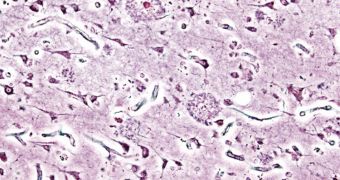Scientists with the Dominantly Inherited Alzheimer’s Network (DIAN) international research partnership say that they were recently able to develop the first clear timeline detailing how the brain develops Alzheimer’s disease.
The new dataset will come in handy for researchers who are working hard towards finding ways of addressing the condition. Alzheimer’s is a neurodegenerative form of dementia that currently has no cure. Its primary mode of action is by damaging neurons and attacking cognitive capabilities.
Since it primarily manifests itself in the elderly, and the general population of the developed world is growing, the condition is expected to put huge strains on national healthcare systems over the coming decades, PsychCentral reports.
While the therapies experts managed to propose thus far have largely proven ineffectively at treating the condition, some have argued that this is because the dementia starts manifesting clear symptoms only after it has already taken a hold of the brain.
But the team behind the new dataset, which also included scientists from the University of Washington in St. Louis (WUSL) School of Medicine (WUSM), suggests that the earliest signs of the condition set in as many as 25 years before the first discernible symptoms appear.
In order to compare the new timeline, the investigators looked at a series of markers for Alzheimer’s disease that appear long before the condition sets in. This was made possible by surveying 128 test subjects who came from families whose genetic history predisposed them to developing the disease.
“A series of changes begins in the brain decades before the symptoms of Alzheimer’s disease are noticed by patients or families, and this cascade of events may provide a timeline for symptomatic onset,” WUSM expert and lead study author, Randall Bateman, MD, says.
“Family members without the Alzheimer’s mutations have no detected change in the markers we tested. It’s striking how normal the Alzheimer’s markers are in family members without a mutation,” he goes on to say.
The research was made possible by funds provided through the US National Institutes of Health (NIH). Details of the work were published in the latest issue of the prestigious New England Journal of Medicine.
“As we learn more about the origins of Alzheimer’s to plan preventive treatments, this Alzheimer’s timeline will be invaluable for successful drug trials,” Bateman concludes.

 14 DAY TRIAL //
14 DAY TRIAL //